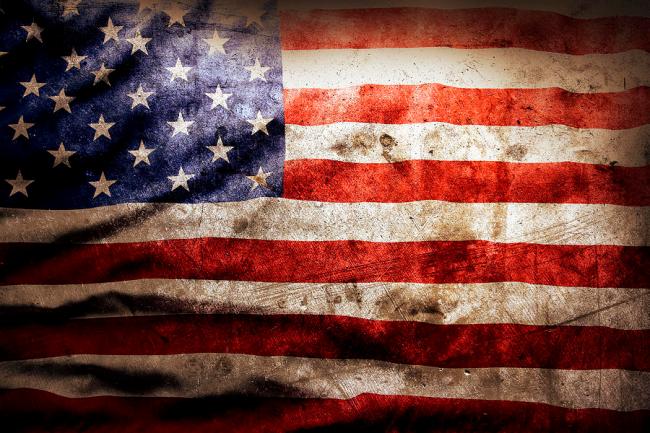Ninety percent of what you read below (pre-rant) came from an entry at Dictionary.com entitled Oops! Those aren’t the real words!. I think word etymology can be fun sometimes, even quirky, and this entry is a delightful illustration of that premise. I have made some minor additions, ones which I highly doubt you can’t see. The bit about the graphic at the end is all me.
 Did you begin the school day by placing your right hand over your heart and reciting the Pledge of Allegiance? If you were among the many kids who thought “indivisible” was “invisible,” or “liberty” was “liver tea,” you were not alone. We don’t have a definition for liver tea, nor do we believe anyone would drink it, but this common misunderstanding of a phrase is called a mondegreen.
Did you begin the school day by placing your right hand over your heart and reciting the Pledge of Allegiance? If you were among the many kids who thought “indivisible” was “invisible,” or “liberty” was “liver tea,” you were not alone. We don’t have a definition for liver tea, nor do we believe anyone would drink it, but this common misunderstanding of a phrase is called a mondegreen.
A mondegreen is a misinterpretation of a word or phrase that shares homophony (sounds like) another word or phrase that has been heard.
Not to be confused with a malapropism, which is the unintentional improper use of a single word, mondegreens are often applied to a line in a poem or a lyric from a song – usually with amusing results.
James Gleick, an American author and journalist, believes the mondegreen is a distinctly modern event. “Without improved communication and standardization of language which accompanies it, there would have been no way for this shared experience to have been recognized and discussed.”
Some popular mondegreens include:
• “’Scuse me while I kiss this guy “(‘Scuse me while I kiss the sky from “Purple Haze” by Jimi Hendrix)
• “Alex the seal” (Our lips are sealed from “Our Lips Are Sealed” by the Go-Go’s) — You have to be a serious idiot to screw that one up! C’mon . . . Alex the Seal?
• “Hold me closer Tony Danza” (Hold me closer tiny dancer from “Tiny Dancer” by Elton John) — This is worse than Alex the Seal!
An example of a reverse mondegreen is Iron Butterfly’s 1968 hit “In-A-Gadda-Da-Vida” which was originally titled “In the Garden of Eden.”
Now it’s your turn – share some of your favorite mondegreens, below. What did you believe were the words to the Pledge of Allegiance or the Star-Spangled Banner?
Better yet, if you seriously thought those lyics were about Alex the Seal and Tony Danza, don’t tell me what you believe the words to the Pledge and SSB were. I think I would cry.
“Liver tea”? Really? Perhaps I should axe you how much time you have spent at a libary.
Now, one last little note — I’m sure you couldn’t help but notice the graphic. I rather like it. I found it while trying to find a better graphic for the Pledge than Dictionary.com had — but here’s the thing: I found this image after I saw one of the Pledge missing the words “under God.”
If you have read my blog long enough you know of my patriotic and American history bent. So seeing an image of the Pledge without the words “under God” shot up a flag as large as Old Glory herself (she’s the flag housed in the National Museum of American History in Washington, D.C.
That ‘godless’ image was from a site hosted by a group who call themselves RestoreThePledge.org. They claim “under God” is a governmental sanction of religion. From their site: ” . . .the words “under God” are clearly a promotion of a specific religious belief.”
Really?
Unsurprisingly, they don’t mention any specific religious sect. Liberals and Progressives are killing this country . . . I swear to God.
Our founders came from a wide range of religious affiliations, a large majority of early America being Protestant. Yet scholarship has repeatedly shown that all these men felt the birth of our country was based soley upon the grace of Providence. Faith, and a belief in moral virtue—and God—were intimately entwined in most everything our founders struggled for.
Here is, apparently, the rationale under which these misguided zealots operate,. again from their site: “These words, added by Congress in 1954, are in violation of the First Amendment – “Congress shall make no law respecting an establishment of religion…”
The Pledge is a law? What the f***? Why haven’t I read about that in my amateur research on American history . . . and while candidly stating my scholarship as “amateur” I am equally convinced that what I know about our history, compared to what they do, could probaly stun a herd of water buffalo.
Saying “under God” in the Pledge breaks no such law. Congress has made no such law. And in case you fece-lfinging simians-cum left wing troglodytes didn’t get the memo I feel it my duty to include the text of the entire First Amendment of the Constitution you so freely use as a desecretory doormat:
Congress shall make no law respecting an establishment of religion, or prohibiting the free exercise thereof; or abridging the freedom of speech, or of the press; or the right of the people peaceably to assemble, and to petition the Government for a redress of grievances.
Incredibly potent stuff, unlike the grey matter you lemmings call brains.
So, per usual, a lengthy reason for my actions. All that to explain why I chose that picture . . .
Because I believe . . . and because I am an American.
May God Bless the United States of America.
Maybe you drooling simpletons would like to extinguish that from all presidential speeches, too.
* Technorati claim token NDZETN3EZ2V5
Read Full Post »












